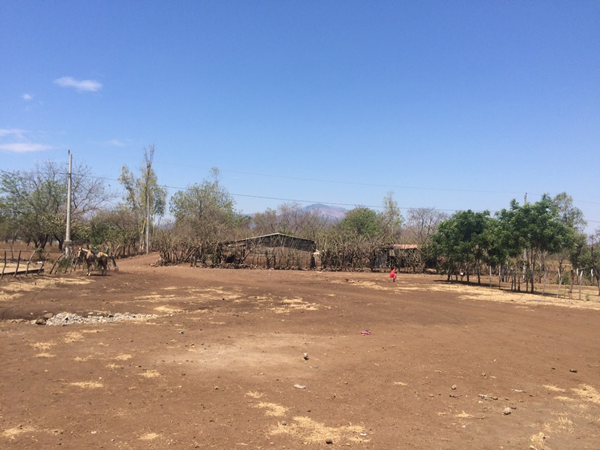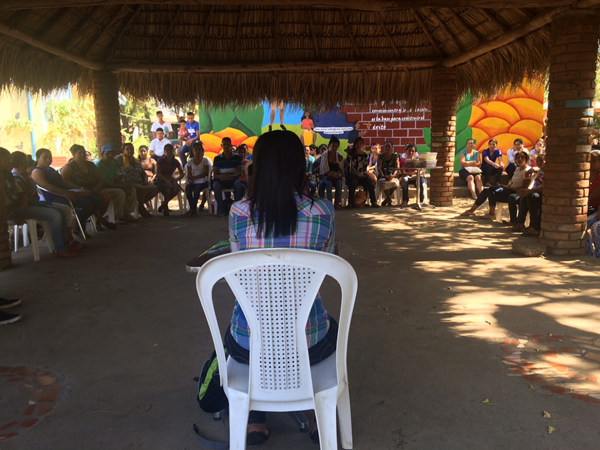Follow a member of GlobalGiving’s grantmaking team to Nicaragua, where she meets a scholarship coordinator who reminds her of her own educational journey and the importance of mutual understanding in grantmaking.
“Jose Esteban is not registered here,” the registrar at the University of Managua tells me over the hum of the fan in his office in Leon, Nicaragua.
I looked back at my paper copy of the grant report and the bold letters stared back at me: Jose Esteban – First Year Student – University of Managua – Law – $41.67 – Monthly Stipend Paid.
This was not the first concern that had arisen in managing this grant over the last two years, a $300,000 award over three years to support scholarships, housing, and access to water in rural Nicaragua. The mid-term report had calculation errors in expenditures, inaccurate reporting of total scholarship awards, misinformation regarding scholar registration, and a potential violation of GlobalGiving’s nondiscrimination policy. These concerns led me here, to the registrar’s office in Leon, staring down at the grant report yet again, wondering where Jose and his monthly scholarship stipend were.
As a Partner Services Associate at GlobalGiving, I manage domestic and international grants on behalf of companies, foundations, and individual donors. I ensure that grantees are performing charitable work in a transparent and accountable manner that complies with local and international regulations, as well as GlobalGiving policies. Despite some concerns, I wasn’t ready to give up on this grant and the 200+ students and families that depend on it.
 Nuevo Amanecer where horses, feet, and bikes are a more common form of transport than a school bus.
Nuevo Amanecer where horses, feet, and bikes are a more common form of transport than a school bus.
Two days later, I meet Karla Toval, the scholarship coordinator for the grant project. We navigate a pickup truck through a herd of cattle on the road to Nuevo Amanecer, a rural farming community two hours from Leon where 25 of the grant scholars live, including Jose.
On our way to Nuevo Amancer, Karla shares how she went from scholarship recipient to scholarship coordinator.
Without a scholarship, Karla would not have had the opportunity to get a degree in journalism.
And without her current position, she would not be continuing her pursuit of a second degree in English.
As we approach Nuevo Amanecer, I ask Karla the question that’s been in the back of my mind: Why isn’t Jose registered at the University of Managua?
“Ah, Jose, he’s in his first year of studies. He just switched registration to the University of Martin Lutero to study law. Here’s the registration form,” she says as she hands me his stamped official registration.
“It’s not uncommon for first year students to take some time before they decide on the right major and school; it’s a big decision. Sometimes, in our original application period they have indicated a major or school that they then realize doesn’t fit their interests, skills, or schedule,” she explains.
Karla clearly speaks the language of the 175 scholars that she leads. And now Karla and I are speaking the same language. We are speaking in Spanish, but also speaking as former students and active changemakers who are empathetic and dedicated to supporting a successful scholarship program.
Upon arriving in the community, I become even more fluent in Karla’s leadership, the local culture, and the scholarship program.
Karla kicks off this month’s scholarship meeting in Nuevo Amanecer with a conversation around the importance of service, what it’s like to start at a new university in a large city, the challenges faced with long transportation times, and how to overcome barriers as a cohort of scholars.
 Karla leading a monthly scholarship meeting with roughly 100 scholars.
Karla leading a monthly scholarship meeting with roughly 100 scholars.
My confidence in the grant compliance strengthened even more after Karla introduced me to Reyna and Maria. They had both received scholarships over the last four years, while also becoming new mothers. This addressed another concern that had spurred my visit. The project’s mid-term report stated that any scholar who became married or pregnant would lose their scholarship. Here in person, with Karla as a guide, it was clear that the mid-term report misrepresented the grant program.
On the ride home, I’m able to share my higher education experience with Karla. Scholarship support was also critical to my path to higher education. I, too, worked while studying full time and understand the sacrifice and hard work required to achieve long-term goals. Just as Karla is dedicated to learning English, my dedication to Spanish is what allows me to speak the same language as Karla today.
At the end of the week, Karla showed me copies of sign-in sheets and receipt of funds for the last month. Seeing the documents, carefully wrapped in a plastic bag in Karla’s backpack, immediately eased my concern about releasing the next round of grant funds. She had done her due diligence as scholarship coordinator, requiring that each student show her their grades and/or registration form before they received scholarship funds. This was the proof I needed, and couldn’t get a month earlier from my desk in D.C., to know that grant funds were spent responsibly.
The site visit allowed GlobalGiving to continue funding 175 scholars and future leaders, the construction of 60 homes for families in need, and a water access project. As grantmakers, we are expected to be risk-averse. However, we must learn to speak the language of our grantees in order to support underserved communities around the world. That means being unwavering in our commitment to accountability while also being open to meeting our grantees in their offices, accepting non-traditional proof of social impact, and providing additional flexibility or training to empower staff as needed.
At GlobalGiving, we have a vision of unleashing people’s potential to create positive change. We support 550+ grantees in partnership with more than 190 companies around the world to unleash this potential.
As a grantmaker, it is deeply rewarding to learn from a leader like Karla, someone who has access to opportunities because of a program you believed in, someone who’s paying it forward and helping others realize their dreams, too. But getting to experience this moment means you have to be fluent in international grantmaking.
Here are my top three recommendations for grantmakers who want to get there:
Being fluent in your grantee’s first language is immensely helpful, but it’s not always possible. The good news? There are other ways to “speak the same language”—kick-off calls, reviews of grant terms, and site visits are great tactics. Asking the grantee to clarify the roles of the grant implementation and compliance teams is another way to ensure that the grantor and grantee are aligned in reporting expectations.
Grant managers review reports with care and incredible attention to detail, ensuring that terms and conditions of grant agreements, proposals, and budgets are followed. However, we also must remain open with grantees in a commitment to support the grant objective. At GlobalGiving, we are always open to hear our grantees’ feedback, suggestions, challenges, and successes. If unexpected challenges present themselves in the implementation of the grant, the grantor should be curious about why this is the case and be open to creating collaborative solutions.
A successful grant manager has an eye for details, compliance, and financial reporting. We can easily get drawn into the challenges of insufficient reports; however, we must remember the overall purpose of the grants being funded. I recommend routinely sharing out the impact of your grants, through storytelling or numerical data, to your internal and external audiences to reinforce the broader purpose of your international grantmaking program. At GlobalGiving, we share a “Moment of Bliss” at weekly staff meetings to highlight successes in our grants programs. We also document any kind words from our grantees, community members, or corporate partners in our internal Wiki for when we need a little pick me up.
I hope these tips help you navigate the complex, but infinitely rewarding, world of international grantmaking.
Learn more about GlobalGiving’s approach to grantmaking.
Note: To protect our constituents, some names in this article may have been changed.
Featured Photo: Karla leading a monthly scholarship meeting with roughly 100 scholars by GlobalGivingFind exactly what you're looking for in our Learn Library by searching for specific words or phrases related to the content you need.